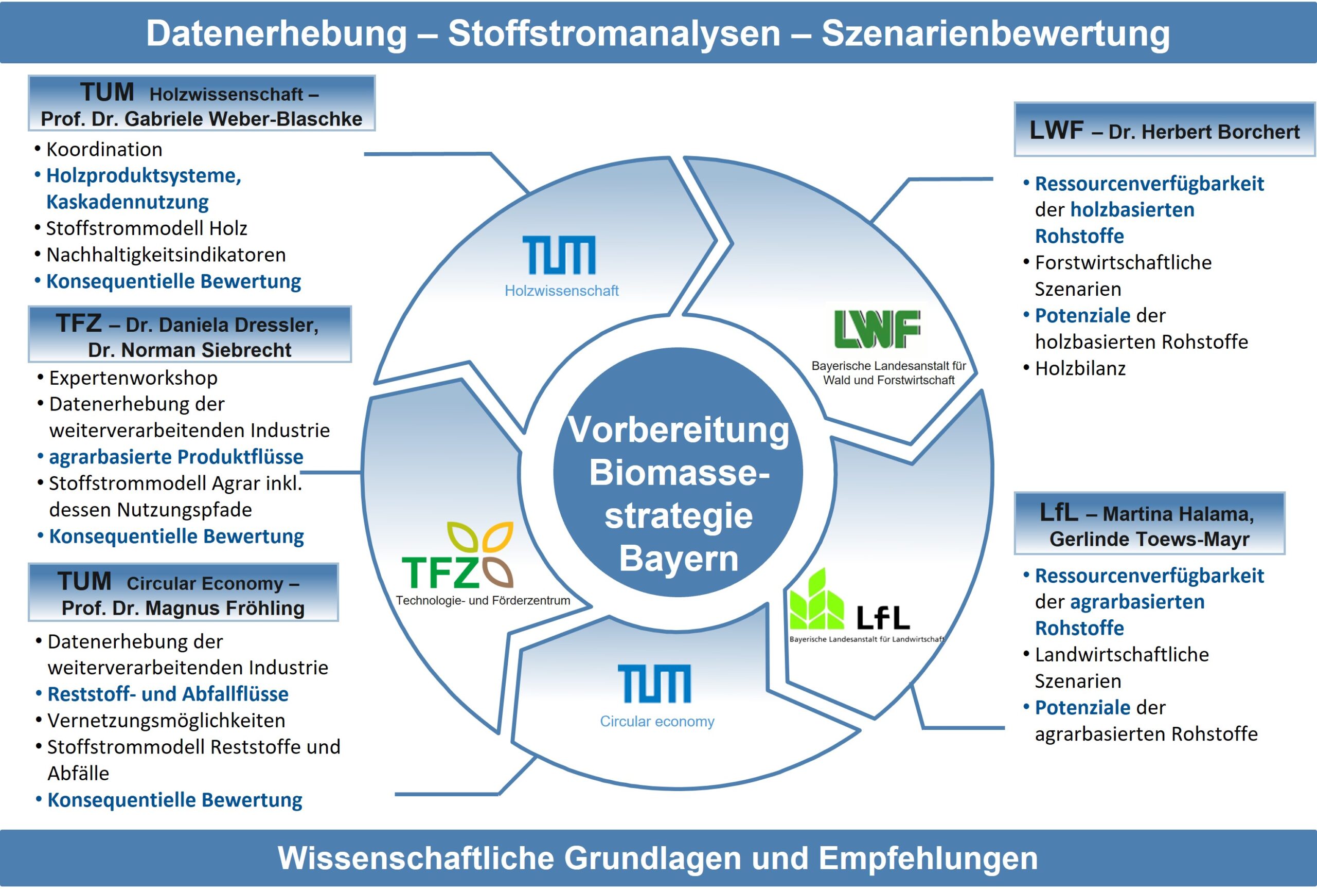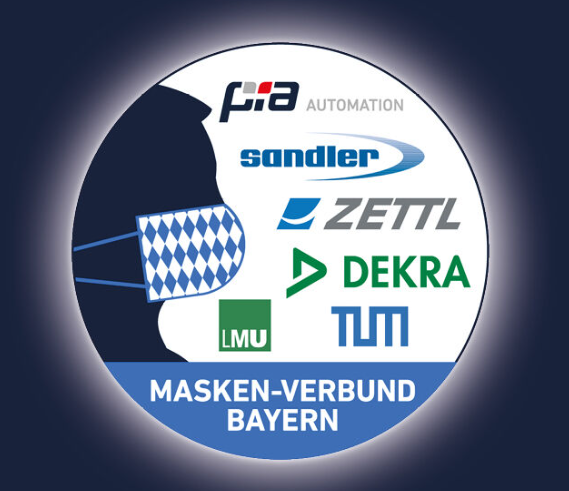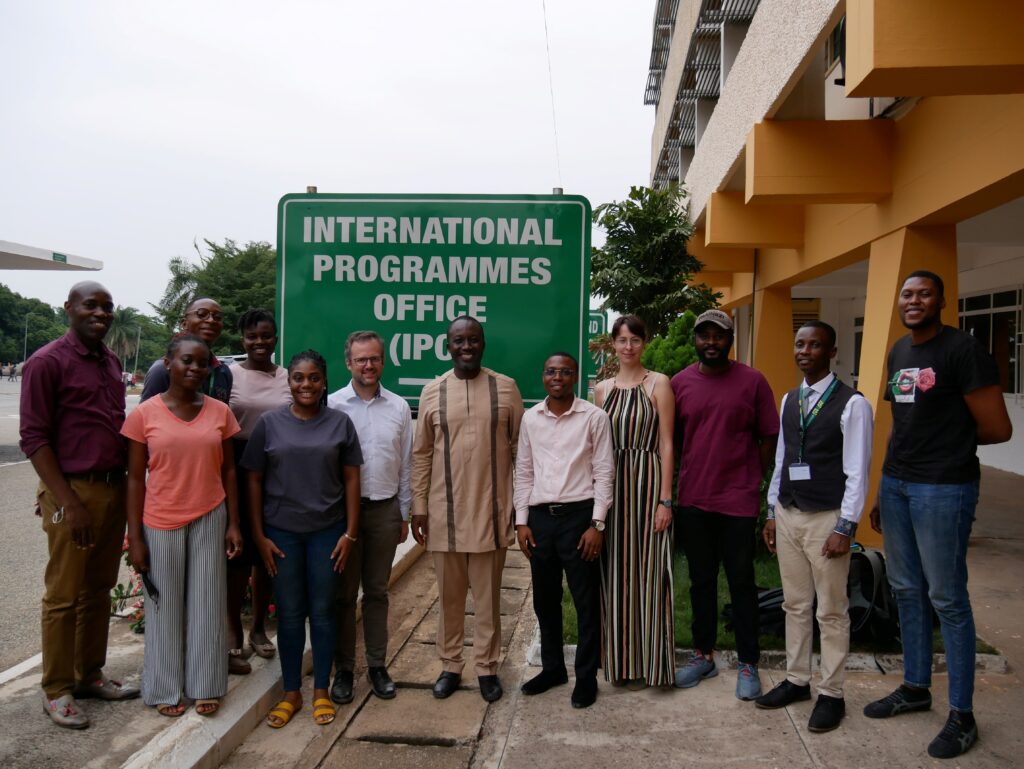Bavaria’s bioeconomy strategy aims to shift from fossil to bio-based economic practices. A collaborative project has been initiated to prepare a scientifically grounded Bavarian biomass resource strategy (Bayerische Biomasse-Ressourcenstrategie – BioReSt). The objective is to gather information on biomass flows in Bavaria and develop economically and ecologically viable approaches for their provision, utilization, and circularity. The Chair of Circular Economy focuses specifically on organic waste within this context. The methodology includes data collection, potential analysis, material flow analysis, evaluation, and strategy development.
Weitere Abbildungen
Projektdauer
2021-01-01 – 2024-09-30
Beteiligtes Personal
Projektausführung
Trond Lehmann, M.Sc.
Lehrstuhl für Circular Economy and Sustainability Assessment
- Doktorand
- Research Associate
Projektpartner
Funding
Bayerisches Staatsministerium für Ernährung, Landwirtschaft, Forsten und Tourismus (StMELF)
During the COVID-19 pandemic, demand for the disposable FFP2 mask increased dramatically. The provision of sustainable products is particularly challenging in the healthcare sector, where hygiene plays a central role. The primary goal of FUMA is to develop a sustainable, user-friendly and competitive FFP2 mask. The focus is on local value chains, high user acceptance (wearing comfort, low breathing resistance, etc.) and certification by a German testing body. Circular economy concepts whose implementation is associated with greater hurdles are also being investigated. These include concepts that rely on renewable raw materials, established and innovative recycling concepts and reuse concepts. Life cycle assessments (LCAs) are carried out during development to ensure the design of a sustainable FFP2 mask.
Projektdauer
2021-04-01 – 2024-09-30
Beteiligtes Personal
Projektausführung
Svenja Klose, M.Sc.
Lehrstuhl für Circular Economy and Sustainability Assessment
- Doktorandin
- Research Associate
Projektpartner
Funding
Bayerisches Staatsministerium für Wirtschaft, Landesentwicklung und Energie (StMWi)
This project focuses on the development of flexible living concepts made of wood for different phases of life (“relationship founders” and “retirees”). The housing concepts are to cover the partially identical wishes of the respective users, but are also to be developed in the sense of sustainable construction and optimised by means of various sustainability parameters (e.g. choice of materials, design of the housing concepts). In view of the oversupply of wood, the aim is to maximise the use of ZE wood (wood resulting from unplanned felling caused by random events such as windthrow or bark beetle infestation) in these housing concepts in order to put it to high-quality use and store carbon in the long term.
Continuously updated information can be found on the website of C.A.R.M.E.N. e.V..
Projektdauer
2021-01-01 – 2024-08-31
Beteiligtes Personal
Projektkoordination
Projektausführung
Josef Huber, M.Sc.
Administration
- Doktorand
- Research Associate
Projektpartner
Funding
Bayerisches Staatsministerium für Ernährung, Landwirtschaft, Forsten und Tourismus (StMELF)
The project aims to build on the existing collaboration between TUM and KNUST by conducting bidirectional workshops. The primary objective is to build on the findings of the 2022 research trip and derived challenges and opportunities of sustainable e-waste management. The workshops will foster knowledge exchange and collaboration by bringing together central stakeholders, including researchers and students from TUM and KNUST, as well as formal and informal Ghanaian stakeholders contacted during the 2022 field trip. By fostering interdisciplinary approaches, the workshops aim to develop sustainable solutions that balance environmental concerns with the socioeconomic needs of underprivileged citizens involved in the informal recycling system. In addition, the project aims to support Ghanaian e-waste start-ups by strengthening and expanding the German-Ghanaian network to contribute to a more efficient and sustainable e-waste management ecosystem in Ghana. Expected outcomes include a deeper understanding of e-waste challenges and opportunities, interdisciplinary approaches to solving the problem, and fostering the German-Ghanaian university partnership.
Projektdauer
2023-09-01 – 2024-08-31
Beteiligtes Personal
Projektausführung
Vanessa Heinrich, M.Sc.
Lehrstuhl für Circular Economy and Sustainability Assessment
- Doktorandin
- Research Associate
Projektpartner
Funding
Technical University of Munich
Accompanying research for the sustainability assessment of individual funding projects of the funding measure r+Impuls – Innovative Technologies for Resource Efficiency.
Further information can be found here.
Funded by the Federal Ministry of Education and Research (BMBF).
Projektdauer
2016-01-01 – 2023-12-31
Function-optimized biosurfactants based on regionally available raw materials using optimized biotechnological processes for the manufacture of products in the fields of detergents and cleaning agents, cosmetics, bioremediation, plant protection and food.
Funded by the Federal Ministry of Education and Research (BMBF).
Projektdauer
2018-01-01 – 2021-12-31
Recycling of PUR composite waste by coupling individual and sensor-supported recycling technologies.
Funded by the Federal Ministry of Education and Research (BMBF).
Projektdauer
2021-01-01 – 2021-12-31
Global Incentive Fund Imperial College London
Projektdauer
2019-01-01 – 2020-12-31
Global Incentive Fund Kwame Nkurmah University of Science & Technology
Projektdauer
2019-01-01 – 2020-12-31


